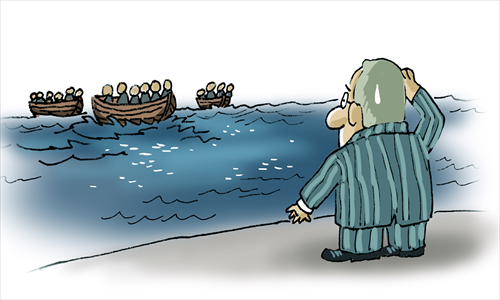EU integration tested with refugee crisis

Illustration: Liu Rui/GT
Thousands of migrants have crossed into Serbia over the weekend after Macedonia gave up its attempts to prevent people from entering by force. Just days before the event, the police clashed with the refugees on Macedonia's southern border with Greece for days, resulting in a few injuries.
The EU is grappling with "its worst refugee crisis since WWII," as reported by AFP. The EU countries are experiencing difficulties in absorbing the influx of refugees, who mainly come from Africa and the war-torn Middle East.
The reasons underlying the refugee crisis are worth exploring. The EU's efforts for integration have made the problem harder to solve. Brussels is striving to settle a number of matters on an EU level and seeks to distribute the asylum seekers to its member states. However, the more the EU countries are striving to settle problems as an integrated whole, the more likely this would trigger counter effects.
Integration means that the member states would have to transfer varying degrees of national sovereignty to the headquarter. Admittedly, EU members ought to move forward jointly when facing difficulties. But under difficult situations, for instance, the influx of refugees, the feeling of uncertainty and insecurity experienced by the member states would become much more intense.
This insecurity has been reflected in the treatment of the migrant crisis. It seems that the member states are suspicious of the effectiveness of a unified European policy to tackle the problem.
If the EU had not called for the relocation plan, namely, each member state receives a number of asylum seekers, some EU countries would not have been prompted to take some extreme actions, for instance, building fences on the border to prevent the flow of the migrants. This means the efforts to settle the issue in an integrated way are very likely to provoke counter consequences.
The Western countries have meddled in the Middle East and Africa for years. The unrest in these regions is an important exterior factor for the influx of asylum seekers.
Europe, by military and political interference, hopes to create a situation in these regions beneficial to itself. However, the reality is that the interference, to some degree, has resulted in the breakdown of the political system and a large number of refugees pouring out of these regions.
Therefore, European countries have to reflect on the devastating effects, namely the damage to the regional politics and economies, of their foreign policies in the regions.
The migrant crisis will affect Europe in many ways.
Politically, it is likely that the European extremists or the right-wing parties will take advantage of the crisis to rally support. It will harm political stability in the region. Besides, the huge number of refugees means Europe faces the threat of potential terrorism.
The reception centers for the refugees will cost the governments a large amount of money. The follow-up treatment for the asylum seekers also hinges on the financial support from the governments. How these migrants integrate with the locals is another social problem.
The settlement of the migrant crisis depends on whether these European countries can reach a compromise. Some European powers, for instance, the UK, France and Germany, should take the lead on the issue. However, these countries have different stances on their capacities to absorb the refugees and thus the current problem is how the compromise can be reached.
Apart from allocating the refugees to the member states, the European countries need to come up with better ideas. While considering EU integration, the asylum policies should also take the individual situations of the member states into consideration. Judging from the current situation, a compromise is hard to reach.
The author is director of the Department for European Studies at the China Institute of International Studies. opinion@globaltimes.com.cn